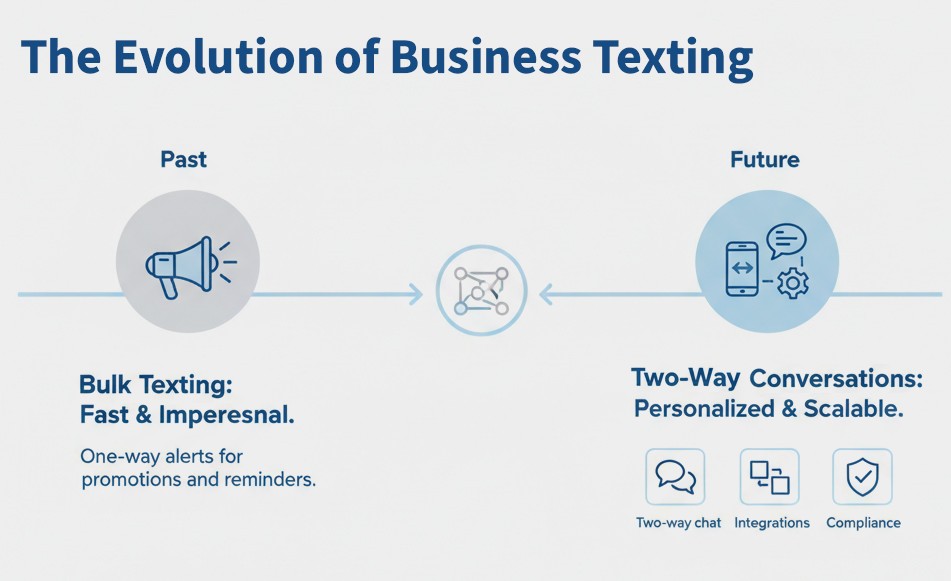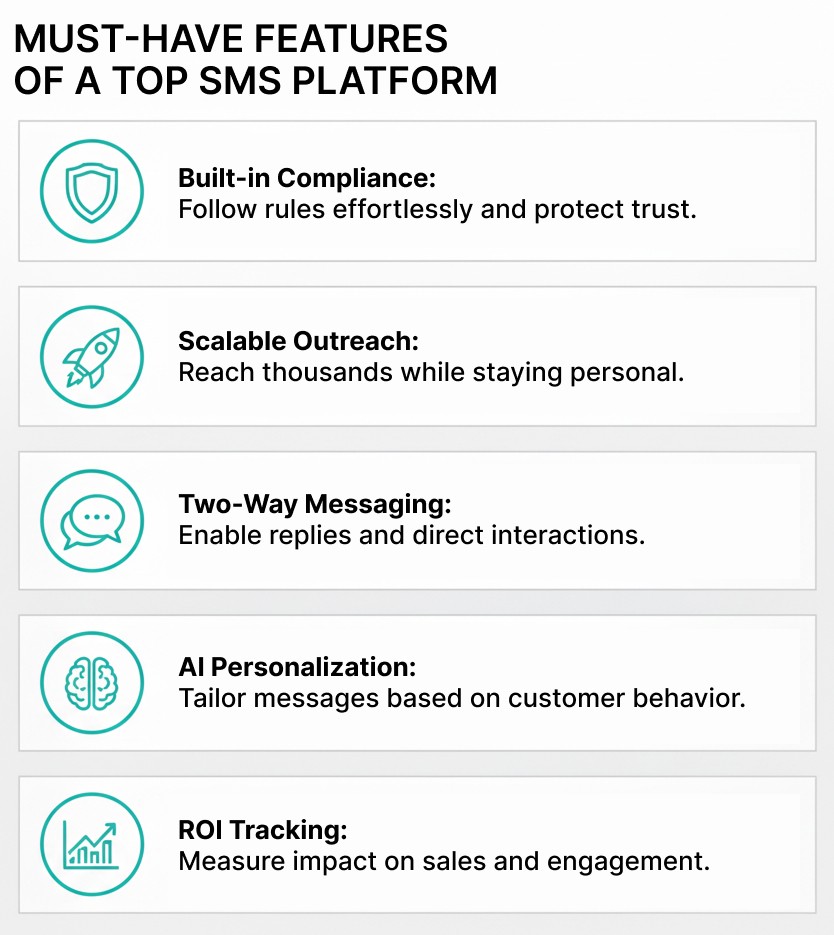With SMS open rates reported at 98%, far higher than email, businesses are increasingly turning to text messaging platforms to strengthen customer connections. Not long ago, texting in business meant sending the same message to hundreds of people at once. It worked for quick updates, but often felt cold and impersonal. Today, customers expect genuine conversations, and a business SMS platform can enable that. It turns texting into a two-way channel where companies can answer questions, share updates, and build trust. With the right texting service, even large businesses can communicate personally and effectively, fostering stronger customer relationships.
From Mass Texting to Smart Conversations
Bulk text messaging was the primary way businesses reached customers. It was fast, low-cost, and easy to manage, which made it the standard for promotions, reminders, and alerts. These mass blasts were useful, but they also had clear limits. Messages often felt impersonal, and customers had no simple way to reply or ask questions.
Modern SMS campaigns and advanced texting services can help businesses move beyond sending notices. This supports two-way conversations where customers can respond, interact, and complete actions. This shift changes texting from a one-way push into a tool for meaningful communication.

Key Benefits of Modern SMS Solutions for Businesses
A modern business text messaging service offers features that help companies communicate better and keep customers engaged:
| Feature | Description |
|---|---|
| Built-in compliance | Ensures every message follows industry rules and protects customer trust. |
| Scalable outreach | Send texts to hundreds or thousands without losing the personal touch. |
| Clear reporting | Track performance, see open rates, and adjust strategies with real data. |
| Two-way messaging | Let customers reply, ask questions, and confirm details directly by text. |
| Stronger relationships | Quick replies and personal conversations help customers feel valued. |
| Reliable delivery | Generally more effective than emails, which often go unread: SMS messages have a reported 98% open rate, compared to email’s typical 20%. |
Marketing Power with Texting
SMS marketing platforms can help businesses reach customers directly and encourage responses.
Here are some of the most effective uses:
| Feature | Description |
|---|---|
| Promotional campaigns | Share discounts, flash sales, or new product launches. |
| Customer reminders | Reduce no-shows by sending texts about appointments or bookings. |
| Loyalty rewards | Send exclusive offers to repeat customers to build long-term relationships. |
| Instant updates | Quickly reach a wide audience with critical information, like a last-minute event change or an emergency alert. |
| Personalized messages | Tailor texts to customer interests for higher response rates and a more personal feel. |
Advanced Features to Look For
Effective solutions often include features beyond basic messaging, such as automation tools and integrations.
| Feature | Description |
|---|---|
| Automated software | Schedule reminders, confirmations, and follow-ups without manual effort. This saves staff hours every week and keeps communication consistent. |
| AI-driven personalization | Analyze customer behavior and send tailored messages at the best time of day. This increases open rates and boosts campaign results. |
| Seamless integrations | Connect with CRMs, marketing systems, and help desk tools. Teams manage texts in the same place where they already work. |
| Timely triggers | Automatically respond to events like sign-ups or abandoned carts. Customers get timely responses that guide them toward taking action. |
| Detailed ROI tracking | Advanced platforms tie these communications directly to outcomes like sales, bookings, or support tickets, showing a clear business impact. |

SMS Challenges and How to Avoid Them
While SMS offers strong engagement potential, it comes with challenges that businesses must address:
- Spam perception: Overuse can lead to customer fatigue and reports.
✅Avoid it by: Building opt-in lists, limiting frequency to 1-2 messages per week, and including clear value in every send. For contrast, brands that blast unrelated promotions risk being blocked, damaging trust more than building it. - Compliance requirements: Regulations like TCPA and GDPR demand strict handling of consents and data.
✅Avoid it by: Choosing providers that support automated opt-outs, consent tracking, and region-specific rules (e.g., TCPA fines up to $1,500 per violation). - Character limits: Standard messages cap at 160 characters, restricting detail.
✅Avoid it by: Using short links, abbreviations, or multimedia attachments where supported, and prioritizing concise, action-oriented language.
How to Choose a Platform
When comparing a simple texting tool to a comprehensive SMS solution, focus on details that truly stand out.
1. Integrations
A basic texting tool can only send messages. A full platform connects with CRMs, support desks, and marketing systems, so everything works together. Imagine a shop owner who uses customer data from their CRM to send texts about new arrivals. That small touch feels personal and keeps the message relevant.
2. Scalability
Older tools often slow down or fail when the volume grows. A strong SMS provider should handle thousands of messages at once without delays. Think of a school that needs to alert parents instantly about closures. If the system lags, the value of the message is lost.
3. Compliance
Rules around texting are strict, and not every tool can keep up. Platforms with built-in compliance features make sure opt-outs are managed and sensitive data is protected. A healthcare clinic sending appointment reminders can do so with peace of mind, knowing the system follows the law.
4. Customer Support
When issues arise, help needs to be quick. A platform offering live chat, training, and clear guides makes all the difference. Picture a restaurant chain running a holiday promotion — if coupon texts don’t go out on time, fast support means the campaign can still succeed.
5. Long-Term Value
A mass texting service may push messages out, but a full platform measures results and ties them to business goals. An online store, for instance, can see how many sales came directly from a promotional SMS. Over time, that insight proves the platform’s worth and helps the business grow.
Smarter Conversations, Stronger Connections
Business texting has evolved from bulk text messaging into a versatile tool for communication. Platforms with strong features — like personalization, compliance, and analytics — can help build meaningful customer connections, allowing companies to scale interactions while maintaining a personal touch.
When evaluating an SMS platform, start by checking three essentials: compliance safeguards, integration with your CRM or marketing tools, and scalability to match your customer base. With these foundations in place, businesses can turn SMS from a simple channel into a long-term driver of customer loyalty.












